Chilean Fjords (Patagonia)
Cruise Port schedule, live map, terminals, news
Region
South America
Local Time
2025-04-13 05:06
 41°F
41°F 4.9°C

 Light breeze
Light breeze3.2 m/s
 48 °F / 9 °C
48 °F / 9 °C 37 °F / 3 °C
Port Chilean Fjords cruise ship schedule shows timetable calendars of all arrival and departure dates by month. The port's schedule lists all ships (in links) with cruises going to or leaving from Chilean Fjords, Patagonia. To see the full itineraries (ports of call dates and arrival / departure times) and their lowest rates – just follow the corresponding ship-link.
| Day | Ship | Arrival | Departure |
|---|---|---|---|
| 15 October, 2025 Wednesday | |||
| 17 October, 2025 Friday | |||
| 18 October, 2025 Saturday | |||
| 18 October, 2025 Saturday | 07:00 | ||
| 21 October, 2025 Tuesday | |||
| 23 October, 2025 Thursday | |||
| 24 October, 2025 Friday | |||
| 24 October, 2025 Friday | |||
| 26 October, 2025 Sunday | |||
| 27 October, 2025 Monday | |||
| 27 October, 2025 Monday | |||
| 28 October, 2025 Tuesday |
Chilean Fjords and Patagonia are part of the Tierra del Fuego provinces of Chile and Argentina. Chile's southern coast is famous worldwide for the significant number of fjords and fjord-like channels (widely known as "Patagonian channels" ) from the parallels of Cape Horn (55 degree south, Tierra del Fuego's southernmost headland) to the Reloncaví Estuary Fjord (42 degree south, off Reloncaví Sound). Some of the channels and fjords are major navigable channels that provide access to ports like Puerto Chacabuco, Puerto Natales and Punta Arenas.
The route is mostly used by ships desiring to avoid bad weather and heavy seas, so frequently experienced on passing into the Pacific from the western end of Strait of Magellan. The huge full-powered mail steamers gain open sea at Cape Pillar (situated at the west entrance of Strait of Magellan), as that time is this way saved to them. However, ships of less engine power, to which avoiding possible danger is of greatest importance, will find that Patagonian Channels is the best route.
The general features of the channels are abrupt, high shores, with innumerable headlands and peaks, remarkably similar in character. Their bold heads give an appearance of such a gloomy grandeur that is rarely seen elsewhere. Generally, the shores are steep-to and for the most part, the channels are open and free. The few existing dangers are ordinarily marked by kelp. The tides are not strong and regular, except in English Narrows.
Since it is impossible to reach and see all the region through Chile by road, the transport of cargo and persons must be done by road, plane or ship according to the country's public infrastructure provision.
In an attempt to carry significant quantities of vehicles, cargo and people directly onto unimproved shore to supply the coastal region and the islands, the ferry service is the best-suited ship type. Most of them are cargo boats without cruise-type accommodations, though they have managed to boost their customer service. Around 150 larger-sized vessels are sailing in Chile's southern regions.
Cruise ships operate between the main ports of the area navigating at low speed along solitary islands and narrow channels. The most visited by ships glaciers in Chile are Pio Xi, PIO X, Agostini, Piloto and Nena, Jorge Montt, Bujo, Amalia, San Rafael (in the Laguna San Rafael National Park). The ship travel experience also features scenic cruising through majestic fjords and waterways like Peel Fjord, Seno Eyre Fjord, Montanas Fjord, Agostini Fjord, Calvo Fjord, Angostura Inglesa (English Narrows), White Narrows, Wide Channel, Smyth Channel, Moraleda Channel, Cockburn Channel, Darwin Channel, Baker Canal, Canal Sarmiento.
San Rafael Glacier is part of Laguna San Rafael NP (1959-established, sized 17420 km2 / 6730 mi2) named after the San Rafael Lagoon - an arc-shaped coastal lake connected to the north with Moraleda Channel and to the south with the narrow Ofqui Isthmus (linking Taitao Peninsula with the Chilean mainland). The Park includes the Northern Patagonian Ice Field and features a scenic fjord (length 16 km / 10 mi) which is usually sailed by cruise ships.
Chilean Fjords cruise terminal
On the following map you can see all ports and itinerary routes used on cruises through Chilean Fjords and Patagonia (Tierra del Fuego provinces of Chile and Argentina).
The list of main cruise ports of call in Tierra de Fuego includes:
- Chile - Valparaiso-Santiago (turaround port), Puerto Montt, Puerto Chacabuco, Puerto Natales
- cruising through Patagonian channels and Chilean fjords
- Argentina - Ushuaia, Puerto Madryn, Puerto Piramides, Buenos Aires (turaround port)
- Uruguay - Punta del Este, Montevideo,
- Some of the itineraries also visit the capital of Falkland Islands - Stanley (on East Falkland).
- Cruise Industry
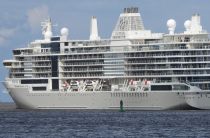
Silversea's ship Silver Ray starts inaugural 71-day World Cruise around South America
Silver Ray, the newest addition to the Silversea fleet, set sail on January 20th, 2024, marking the commencement of her inaugural Grand Voyage - a 71...
January 30, 2025 - Cruise Industry
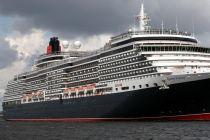
Cunard unveils extended shore excursions for South America 2025 voyages
Cunard Line has announced an array of extended shore excursions as part of its return to South America in 2025, marking its first operation in the...
September 26, 2024 - Cruise Industry
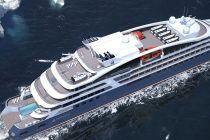
PONANT announces Antarctic Expeditions for 2025-2026 season
The French ultra-luxury cruise travel company PONANT presents an opportunity to voyage to the Antarctic from October 2025 to March 2026, as Ponant's...
March 12, 2024 - Cruise Industry
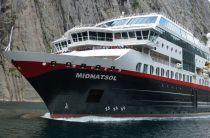
Hurtigruten's ship MS Maud resumes cruises following drydock repairs
After undergoing necessary drydock repairs following weather damage in December 2023, HX-Hurtigruten's expedition ship MS Maud is now scheduled to...
January 21, 2024 - Cruise Industry
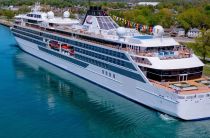
Viking EXPEDITIONS starts 3rd Antarctic season and unveils 87-day Arctic to Antarctica cruise
Viking EXPEDITIONS celebrates the initiation of its third expedition season in Antarctica, as the Viking Octantis and her identical counterpart, the...
December 1, 2023 - Cruise Industry
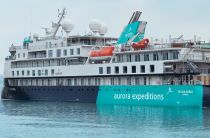
Aurora Expeditions introduces Antarctica 2024-2025 itineraries
Aurora Expeditions Australia (fleet) unveiled its 2024-2025 Antarctic program of 25 voyages ranging from 9- to 23 days in duration. These voyages...
April 14, 2023 - Cruise Industry
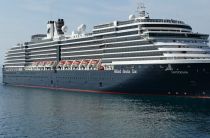
HAL-Holland America unveils 2024-2025 South America, Antarctica and the Amazon River itineraries
HAL-Holland America Line's South America 2024-2025 season invites passengers to embark on an adventure that takes them across the diverse landscapes...
April 6, 2023 - Cruise Industry
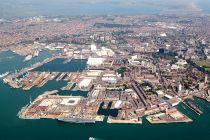
Fred Olsen Balmoral ship's 78-day South America and Antarctica cruise starts Portsmouth UK's 2023...
2023 will see Portsmouth Port UK (England) host more maiden calls/welcome back cruise companies, as it continues to strengthen its place as the first...
January 6, 2023 - Cruise Industry
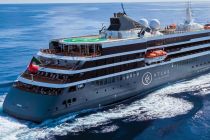
Atlas Ocean Voyages hosts dual naming ceremony for World Navigator and World Traveller ships
AOV-Atlas Ocean Voyages celebrated a milestone weekend with the christening ceremonies for its new sisterships World Navigator and World...
November 22, 2022 - Cruise Industry
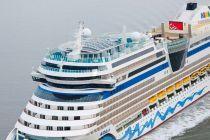
AIDA Cruises unveils shorter legs of AIDAsol’s 117-day World Voyage 2023-2024
As of now, the 117-day World Cruise 2023-2024 on AIDA Cruises' ship AIDAsol can also be booked on shorter legs. The legs' duration varies...
September 29, 2022 - show more news
